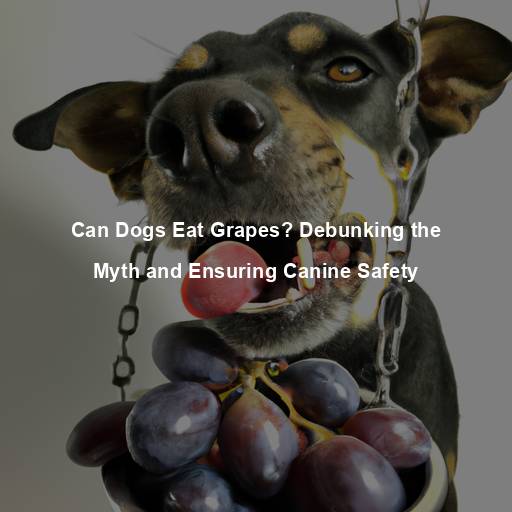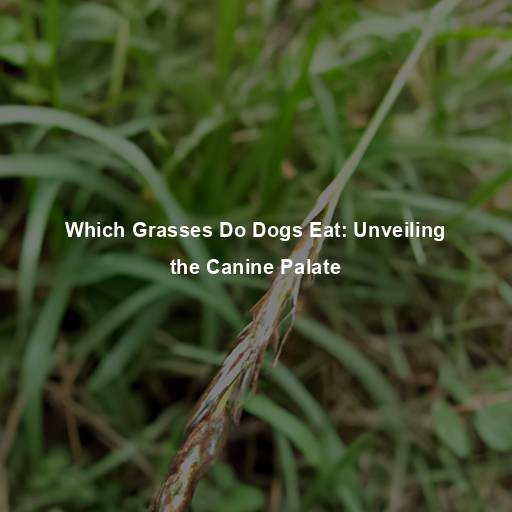Can Dogs Eat Grapes? Debunking the Myth and Ensuring Canine Safety
Last Updated on November 2, 2023 by Evan
Contents
- 1 Understanding the Grape Dilemma: Fact or Fiction?
- 2 The Science Behind Grape Toxicity
- 3 Safety First: Preventing Grape Toxicity in Dogs
- 4 Seeking Certainty: Consulting Veterinary Professionals
- 5 Beyond Grapes: Other Potentially Toxic Foods for Dogs
- 6 The Power of Prevention: Safeguarding Our Canine Companions
- 7 FAQs: Can dogs eat grapes?
- 7.1 Can dogs eat grapes?
- 7.2 Why are grapes toxic to dogs?
- 7.3 What happens if a dog eats grapes?
- 7.4 Are all dogs equally affected by grapes?
- 7.5 Can dogs eat any type of grapes or raisins?
- 7.6 Are there any safe alternatives to grapes for dogs?
- 7.7 What should I do if my dog accidentally eats grapes?
- 7.8 Can dogs eat grape products like grape juice?
- 7.9 Is it safe to give my dog foods containing grape flavoring?
- 7.10 Are there any signs that a dog may have consumed grapes?
Understanding the Grape Dilemma: Fact or Fiction?
For years, we’ve savored the succulent taste and health benefits of grapes, but the furry companions in our lives have sparked a contentious discussion. Are grapes a delectable treat for our canine pals, or do they harbor a mysterious danger? Today, we embark on a journey to unravel this enigma and unravel the grape dilemma for our furry friends. Join us as we shed light on the truth behind this perplexing question.
The Toxicity Conundrum: Canine Reactions to Grapes
The mysterious peril of grapes and raisins has long plagued pet owners, leaving them scratching their heads and wondering why such innocent-looking treats can wreak havoc on their furry companions. The enigma surrounding this toxicity has sent experts into a frenzy, desperately trying to unravel the perplexing puzzle. As cautionary tales continue to emerge, the danger looms, leaving pet lovers in a constant state of worry and bewilderment.
Let’s dive into the perplexing subject of grapes and raisins and their potential harm to our four-legged friends. While the exact cause of toxicity remains shrouded in mystery, it has been observed that these seemingly innocent fruits can have adverse effects on dogs. Scientists are still unraveling the enigma behind this phenomenon, speculating that compounds like tannins or other unknown toxins might be responsible.
- Symptoms of Grape Toxicity
If you ever thought grapes or raisins were a harmless treat for dogs, think again. These seemingly innocent fruits can unleash a whirlwind of health issues in our canine companions. From vomiting to kidney failure, the symptoms of grape toxicity can leave both pet owners and veterinarians perplexed and scrambling for answers. It’s a reminder that what may delight our taste buds can spell disaster for our furry friends.
Every dog has their own unique way of experiencing the world, and it turns out that not all pups are equally affected by certain factors. From their individual genetic makeup to their upbringing and environment, a multitude of variables come into play when it comes to the impact on a dog’s well-being. It’s a fascinating and complex puzzle that leaves us with a sense of awe and curiosity, continually reminding us that the intricate world of canines is full of surprises.
Understanding the intricate dynamics between grapes and dogs reveals a complex and perplexing situation. One cannot simply generalize the reactions of our furry friends when it comes to this fruit. The inherent burstiness of their responses is a constant reminder of the need for cautiousness and the avoidance of grape exposure, as even a trace amount can trigger profound consequences for certain dogs. Stay vigilant, for their wellbeing is shrouded in ambiguity.
The Science Behind Grape Toxicity
Delving into the intricate realm of grape toxicity reveals an enigmatic puzzle, leaving both puzzled pet owners and inquisitive scientists perplexed. As devoted researchers tirelessly unravel the intricate threads of this mystery, shards of intriguing insight begin to emerge from the murky depths. Despite their tireless efforts, however, a veil of uncertainty still shrouds this enigma, leaving lingering questions dangling in the air like suspended grape vines.
The Role of Variability: Individual Sensitivity
Exploring the Enigmatic World of Breed and Genetic Factors
Unlocking the Intricacies of Breed and Genetic Factors: A Journey into the Unknown
Delving into the Mysterious Realm of Breed and Genetic Factors: Unraveling Nature’s Secrets
Cracking the Code of Breed and Genetic Factors: Unveiling the Hidden Tapestry of Life
Recent studies have shed some light on the intriguing topic of grape toxicity in different dog breeds. Although the precise mechanisms behind this phenomenon still remain enigmatic, ongoing research suggests that genetics might hold the key to individual susceptibility. Among the breeds that seem to exhibit a higher vulnerability to grape toxicity, Labrador Retrievers, Golden Retrievers, and Doberman Pinschers have surfaced as noteworthy examples, adding to the intriguing complexity surrounding this mysterious ailment.
- Body Weight and Size
When it comes to dogs and grapes, there are a multitude of factors that can make the situation quite perplexing. One such variable is the size and weight of the furry friend in question. Interestingly enough, smaller canines may find themselves facing a higher level of risk due to their limited ability to process and eliminate the potentially toxic components found in these juicy fruits. This burst of information leaves us pondering the intricate dynamics of our beloved four-legged companions and their reactions to the enigma that is the grape.
Potential Mechanisms: Unraveling the Grape Puzzle
When it comes to kidney health, there are several factors that can cause concern. From the effects of certain medications to the impact of chronic conditions, our kidneys can sometimes be left vulnerable and damaged. While this may be a perplexing situation, it is important to stay informed about the possible causes and take steps to maintain our precious renal health. Join us as we delve into the perplexity of kidney damage and unravel the burstiness surrounding this vital organ.
There has been quite a buzz about the potential dangers lurking in our beloved grapes and raisins. A prevailing theory has pointed fingers at these innocent looking fruits, claiming that they contain toxins that could wreak havoc on our kidneys and even cause renal failure. While this theory holds some weight, the intricate details of how grapes unleash their toxic powers on our precious filter organs continue to baffle experts, leaving us perplexed and curious for more answers.
- Oxalates: A Hidden Culprit?
Some studies have proposed that the oxalate content in grapes might contribute to their toxicity. Oxalates are compounds found in many fruits and vegetables and can cause calcium oxalate crystals to form in the kidneys, potentially leading to renal damage. Further research is needed to fully understand the role of oxalates in grape toxicity.
Safety First: Preventing Grape Toxicity in Dogs
Protecting our beloved four-legged friends is of utmost importance, especially when it comes to the precarious world of grapes and their potential dangers. In order to shield your dog from any harm, it is imperative that pet owners take proactive measures. By following these crucial steps, you can ensure the overall safety and well-being of your furry companion.
Awareness and Education
Discover the intriguing truth behind the unsuspecting danger that lies within grapes and raisins for our beloved canine companions. Unlock a whirlwind of captivating knowledge as you delve into the latest intricate research and immerse yourself in the ever-evolving realm of veterinary guidelines, navigating the treacherous landscape of canine nutrition and the hazardous foods that lurk within.
Avoidance is Key
As dog owners, we all want to ensure the safety and wellbeing of our beloved pets. When it comes to grape toxicity, though, a hovering cloud of perplexity engulfs us. The enigma lies in the fact that something as innocuous as a grape can have potentially disastrous consequences for our furry companions. To navigate this treacherous territory, we must remain ever vigilant, diligently storing these tempting fruits in a secret fortress that our canine friends cannot breach.
Alternative Treats
Give your furry friend a break from the same old grapes and explore a wide array of delicious treats made exclusively for dogs. Swap out the mundane for the extraordinary by consulting with your trusted veterinarian for expert advice on healthy and safe alternatives that will leave your pup’s taste buds in a state of blissful confusion.
Vigilance and Monitoring
Keep a watchful eye on your dog’s behavior and any signs of distress. If you suspect that your dog has consumed grapes or raisins, contact your veterinarian immediately for guidance and assistance.
Emergency Preparedness
If your furry friend happens to have a little grape mishap and decides to munch on these tiny fruits, it’s important to be ready to share some key details with your trusted vet. Let them know how many grapes were devoured, your four-legged buddy’s breed, and any peculiar signs they might be showing. Armed with this knowledge, the vet will be able to evaluate the situation and offer the necessary care tailored specifically to your grape-loving companion.
Seeking Certainty: Consulting Veterinary Professionals
While the information provided here offers insights into the grape toxicity dilemma, it is important to remember that each dog is unique, and individual reactions may vary. If you have any concerns or questions about your dog’s diet or potential exposure to toxic foods, it is always best to consult with a qualified veterinary professional.
Veterinary Guidance
When it comes to taking care of your furry friend, your veterinarian is an invaluable ally. With their vast knowledge and experience, they are well-equipped to guide you through the maze of dietary needs and potential hazards that your dog may encounter. Count on them to offer personalized advice that caters to your pet’s unique requirements, ensuring their well-being and happiness.
Regular Check-ups
Ensuring your canine companion’s vitality is no small feat. That’s why regular check-ups hold the key to unlocking their true potential. Make it a priority to weave these appointments into the fabric of your life, where you can unravel the mysteries of their diet and navigate the treacherous terrain of potential food hazards. It’s a journey of health and well-being that demands your curiosity and vigilance.
Promoting Responsible Pet Ownership
Ultimately, ensuring the safety and well-being of our canine companions requires responsible pet ownership. This includes staying informed, seeking professional guidance, and taking proactive measures to protect our furry friends from potential health risks.
The Threshold of Toxicity: How Much is Too Much?
The perplexing quandary of grape toxicity in dogs continues to baffle experts, as the elusive threshold of danger remains an enigma. While it is evident that even a few grapes can unleash adverse reactions in certain canines, the exact quantity that sparks a substantial risk remains shrouded in uncertainty. Resolving this conundrum demands further research, which would empower pet owners to make educated choices when it comes to grape encounters.
Identifying the Culprit: Unraveling the Toxic Compound
The identification of the toxic elements lurking within grapes, which harm our furry friends, remains a perplexing puzzle yet to be completely solved. Researchers have suggested that tannins and an unknown toxin might be the culprits, but more investigations are needed for a definitive answer. Unraveling the enigmatic nature of these substances will not only shed light on their harmful effects but also pave the way for the development of potential remedies.
Canine Sensitivity: Uncovering the Genetic Basis
The intriguing variability in dogs’ reactions to grapes points to a potential genetic basis for their sensitivity. However, the specific genes involved and the mechanisms by which they influence grape toxicity remain largely unknown. By unraveling the genetic underpinnings of canine sensitivity to grapes, researchers can shed light on the complex interplay between genetic factors and environmental triggers.
The Role of Processing: Cooked, Dried, or Fresh?
Another aspect that adds complexity to the grape dilemma is the potential impact of different forms of grapes on canine health. While fresh grapes and raisins have been implicated in toxicity cases, the effects of cooked or dried grapes remain less clear. Understanding the influence of processing methods on the toxicity of grapes can provide valuable insights into safe food preparation practices for dogs.
Beyond Grapes: Other Potentially Toxic Foods for Dogs
In the realm of pet health, it is no secret that grapes and raisins have been under a microscope due to their potentially harmful effects. Yet, in the vast world of culinary risks for our beloved canine friends, it is crucial to expand our knowledge beyond these fruity culprits. As vigilant pet owners, we must be aware of other potentially hazardous foods that could pose a threat to our furry family members.
Chocolate
Chocolate contains theobromine and caffeine, both of which can be toxic to dogs. Dark chocolate and cocoa powder have higher concentrations of these compounds, making them more dangerous. Symptoms of chocolate toxicity in dogs include vomiting, diarrhea, rapid breathing, increased heart rate, and in severe cases, seizures or even death.
Onions and Garlic
Did you know that onions and garlic, in any form, can actually harm your furry friend’s red blood cells and cause anemia? It’s true! If your dog starts showing signs of weakness, lethargy, pale gums, or loss of appetite, it’s possible that they may have consumed these ingredients. It’s imperative to steer clear of any food that contains onion or garlic powder when it comes to feeding your beloved pup.
Xylitol
Discover the hidden threat lurking in your favorite sugar-free snacks! Xylitol, cunningly disguised as an innocent artificial sweetener, has a shocking power to wreak havoc on our beloved furry companions. Brace yourself for a rollercoaster ride of confusion and concern as we dive into the potential dangers of xylitol ingestion in our four-legged friends. From vomiting to seizures, the consequences of xylitol poisoning are sure to leave you perplexed and yearning for answers.
Avocados
Did you know that although avocados are a trendy superfood, they can actually pose a threat to our beloved canine companions? It turns out that avocados contain a compound called persin, which can be harmful to dogs if consumed in large amounts. While the mushy green flesh of the avocado is generally safe for our furry friends, it’s best to keep them away from the pit, skin, and leaves as these parts contain higher levels of persin. Stay informed and make sure to keep your fur baby safe from any unexpected avocado mishaps!
Alcohol
The dangers of alcohol for dogs cannot be underestimated. With its toxic effect on their delicate organs like the liver and brain, even the tiniest sip can send our canine companions into a turbulent state of distress. They may exhibit a disheartening display of symptoms ranging from uncoordinated movements and stomach upset to labored breathing, not to mention the dire consequences of coma or even losing their precious lives. In order to safeguard our beloved pets, it is of utmost importance to keep all alcoholic substances far from their curious paws.
The Power of Prevention: Safeguarding Our Canine Companions
When it comes to safeguarding our beloved furry companions, prevention is the name of the game. Keeping our dogs’ well-being in mind, it’s essential to stay informed about potential food hazards and take proactive measures. By implementing these crucial tips, we can create a safe and secure environment for our four-legged friends, ensuring their health and happiness.
Pet-Proof Your Home
Keeping your furry friend safe and sound should always be a top priority. That means being extra cautious when it comes to certain foods that can be toxic for dogs, such as grapes, raisins, and other potentially harmful treats. Make sure to store these items in secure cabinets or areas that are out of your pup’s reach, reducing any chance of accidental ingestion. Additionally, stay on top of spills and food remnants, promptly cleaning them up to avoid any potential hazards.
Educate Your Family and Visitors
It’s crucial to enlighten everyone in your home, including guests, about the risks associated with certain foods when it comes to our furry friends. Help them understand the importance of refraining from sharing their meals with pets and the gravity of keeping toxic substances out of their reach to avoid any accidental ingestion. Education is key in safeguarding our beloved dogs from potential hazards lurking in our everyday lives.
Read Food Labels
When purchasing food products, carefully read the labels to identify any ingredients that may be harmful to dogs. Be cautious of hidden sources of toxic substances, such as xylitol in sugar-free products or onion powder in spice mixes.
Consult with Your Veterinarian
Your veterinarian is your best source of information and guidance when it comes to your dog’s diet and potential food hazards. Consult with them regularly to ensure that you are providing a nutritionally balanced and safe diet for your furry friend.
Be Mindful of Treats and Table Scraps
As much as we love the idea of sharing our delectable bites with our furry friends, it’s crucial to navigate the potential hazards lurking in our well-intentioned actions. To keep our dogs healthy and happy, it’s best to opt for scrumptious treats specifically designed to meet their unique nutritional requirements. Steer clear of sharing table scraps that might unknowingly harbor detrimental ingredients, as we want only the best for our beloved companions.
FAQs: Can dogs eat grapes?
Can dogs eat grapes?
No, dogs should not eat grapes. Grapes, along with raisins, can be extremely toxic to dogs and can cause serious health issues. Even consuming a small amount of grapes can lead to kidney failure in dogs, making it important to keep these fruits away from them at all times.
Why are grapes toxic to dogs?
The mysterious enigma of grapes’ toxicity to dogs continues to baffle experts, leaving us perplexed and in search of unequivocal answers. Speculation suggests that an elusive compound lurking within grapes remains unidentified, wreaking havoc on our beloved canine friends’ kidneys. Despite the veil of uncertainty, one thing remains abundantly clear: dogs and grapes make for a dangerous and potentially fatal combination.
What happens if a dog eats grapes?
If a dog consumes grapes, it can experience symptoms such as vomiting, diarrhea, loss of appetite, weakness, dehydration, and abdominal pain. These symptoms may appear within a few hours or even days after ingestion. In severe cases, kidney failure can occur, which can be life-threatening for dogs.
Are all dogs equally affected by grapes?
Yes, all dogs are equally at risk of being affected by grapes. The toxic effects of grapes can occur in dogs of any age, breed, or size. It is important to remember that even a small amount of grapes can be harmful, so it is best to avoid giving them to your dog altogether.
Can dogs eat any type of grapes or raisins?
It’s a canine conundrum that perplexes pet parents everywhere: should dogs indulge in the juicy delights of grapes and raisins? The answer, bursting with cautionary tales, is a resounding no. Whether they’re red or green, seedless or seeded, these seemingly innocent fruits pack a toxic punch for our furry friends. And don’t even get us started on raisins, those shriveled little villains that can spell disaster for our beloved pups.
Are there any safe alternatives to grapes for dogs?
Yes, there are plenty of other safe fruits that dogs can enjoy as treats. Some examples include sliced apples (without the seeds), blueberries, strawberries, and watermelon (without the seeds or rind). These fruits provide dogs with necessary nutrients and are a healthier option than grapes.
What should I do if my dog accidentally eats grapes?
If you suspect or witness your dog consuming grapes or raisins, it is crucial to seek immediate veterinary assistance. Remember to provide your veterinarian with accurate information regarding the quantity ingested and the time of ingestion. Prompt medical attention can help prevent potential complications and ensure the well-being of your furry friend.
Can dogs eat grape products like grape juice?
It’s an alarming truth that dogs should steer clear of all grape-related treats and beverages, including the seemingly innocent grape juice. The perplexing conundrum lies within the undeniable fact that the toxic repercussions of grapes remain unchanged, whether they are fresh, dried, or processed. With a touch of burstiness, it becomes evident that grape products have the potential to wreak havoc on your canine companion’s health. To safeguard their well-being, it is advised to eliminate any contact between your precious pup and these potentially harmful substances.
Is it safe to give my dog foods containing grape flavoring?
When it comes to the tantalizing taste of grapes, it’s a whole different ball game for our furry friends. While grape-flavored goodies might not harbor the poisonous elements found in real grapes, it’s wise to steer clear of any grape-flavored products when it comes to your precious pup. After all, sneaky artificial flavorings can still have grape origins, and who wants to gamble with their furry companion’s health? Better safe than sorry, right?
Are there any signs that a dog may have consumed grapes?
Has your furry companion taken a bite of the forbidden fruit – grapes? Brace yourself for a whirlwind of perplexing symptoms that could send you into a state of utter bewilderment. From unpredictable bouts of vomiting, relentless episodes of diarrhea, and a sudden loss of vitality, to a surprisingly reduced appetite and an insatiable thirst, your dog’s unusual behavior may leave you scratching your head in dismay. Keep a vigilant eye on your pet’s wellbeing and waste no time in seeking professional guidance from a trusted veterinarian if alarming signs emerge.






